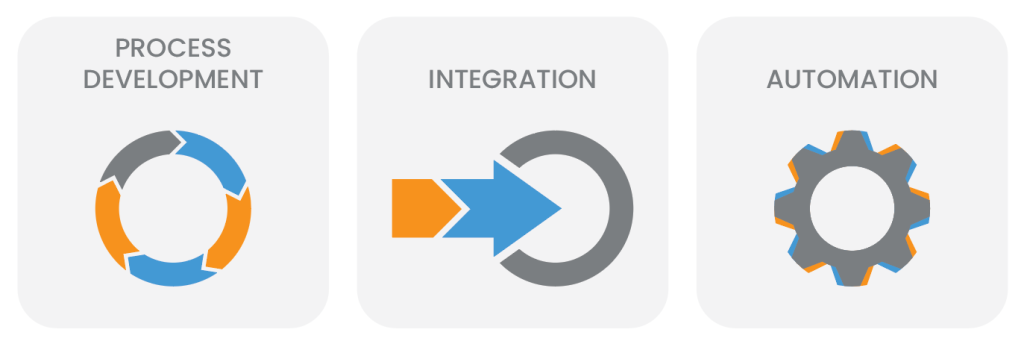What is Process Development?
Understanding Process Development in Manufacturing
Process development is a pivotal component in the manufacturing landscape. But what exactly is it, and why is it essential? If you’ve found yourself pondering these questions, you’ve come to the right place. This article delves into the world of process development within the context of manufacturing, and why it’s a critical factor in ensuring manufacturing efficiency and product quality.
What is process development?
In its essence, process development refers to the strategic, iterative optimization of manufacturing processes to produce goods more efficiently, cost-effectively, and with greater consistency. It encompasses the steps taken to convert raw materials into finished goods by streamlining operations, reducing waste, and ensuring high standards of quality.
What are the key components?
- Design and Prototyping: Before any product hits the market, it starts as an idea. This idea transforms into a tangible prototype. This stage involves design, simulation, and iterative testing.
- Process Mapping: This involves creating a visual representation of the entire manufacturing process. Process maps can highlight inefficiencies, redundancies, and areas for improvement.
- Optimization: At this stage, manufacturers employ techniques to refine processes, reduce costs, and improve product quality. This might involve tweaking machine settings, changing the order of operations, or introducing new technologies.
- Scalability: As demand for a product grows, the manufacturing process should be scalable. Process development ensures that the operations can handle increased production without compromising on quality or efficiency.
- Quality Assurance and Control: Quality checks are integrated throughout the manufacturing process. They ensure the end product meets the desired specifications and standards.
- Continuous Improvement: Manufacturing isn’t static. Process development involves regularly reviewing and refining operations to account for new technologies, feedback, and market demands.
Why is it important?
- Cost Efficiency: Process development aims to reduce waste, utilize resources better, and minimize production costs. As a result, manufacturers can offer competitive pricing to their customers.
- Improved Product Quality: With standardized processes and quality checks, manufacturers can produce consistent and high-quality products. This boosts the brand’s reputation and customer trust.
- Faster Time-to-Market: Streamlined processes mean products can be produced faster and more efficiently. This speed ensures that manufacturers can react to market trends and demands promptly.
- Sustainability: With growing global concerns about the environment, process development can play a pivotal role in ensuring sustainable manufacturing practices. This not only benefits the environment but also enhances a company’s public image.
- Flexibility and Adaptability: In an ever-evolving market, manufacturers need to be flexible. Process development equips manufacturers with the ability to quickly pivot production based on market demands.
Examples of Process Development in Manufacturing
- Automobile Manufacturing: The introduction of the assembly line by Henry Ford for the production of the Model T is one of the most famous examples in modern industry. The assembly line revolutionized automobile production by breaking down assembly into standardized, repetitive tasks. This drastically reduced the time taken to produce a single car, making automobiles more affordable and widely accessible.
- Electronics Production: Let’s consider the manufacturing of semiconductor chips. Over the years, advancements in lithography and other processes have enabled manufacturers to place billions of transistors on a single chip. Continuous process development ensures the miniaturization of these transistors, leading to faster, more energy-efficient, and cost-effective computer chips.
- Pharmaceutical Manufacturing: The development and production of a new drug involve numerous stages of testing and validation. A notable example is the speedy development of COVID-19 vaccines. Advanced processes like mRNA technology, combined with parallel testing phases, expedited vaccine development, reducing the typical development time from several years to under a year.
- Food and Beverage Industry: The move from handmade chocolate bars to automated confectionery production lines showcases process development. Today, technologies like computer vision systems ensure that every chocolate bar meets specific quality standards, while automated machines ensure precise ingredient mixes, leading to consistent taste and quality.
- Textile Industry: Traditionally, producing a piece of clothing, especially intricate designs, was labor-intensive. With advancements like computer-aided design (CAD) and automated looms, manufacturers can now produce complex patterns with high precision at a faster rate.
- Aerospace Manufacturing: Producing aircraft components requires high precision and stringent quality standards. Advanced processes like additive manufacturing (3D printing) are now used to produce certain parts, offering advantages like reduced weight, increased complexity, and decreased waste compared to traditional methods.
Conclusion
Process development is more than just an abstract concept; it is tangible and evident in the myriad of products and innovations we encounter daily. Whether it’s the car we drive, the smartphone we use, or the clothes we wear, the imprint of meticulous process development is everywhere. By continuously pushing the boundaries of efficiency and innovation, process development ensures that industries evolve, adapt, and continue to meet the ever-growing demands of consumers and markets globally.
Pipeline helps OEMs increase or improve their production by developing new manufacturing, testing, & inspection processes, then building specialized equipment, fixtures, & automation around those processes. We do this in months not years, and without taking up your valuable time, while drawing on our deep experience and internal capabilities to ensure the success of your project. Contact us today to get your project started!



